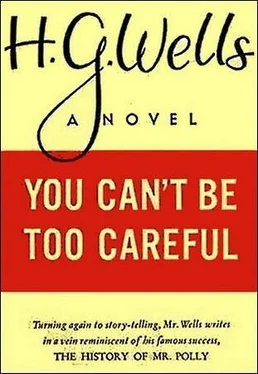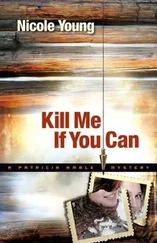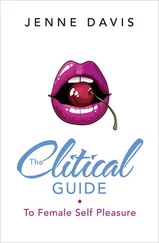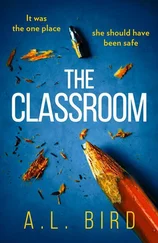H. Wells - You Can't Be Too Careful
Здесь есть возможность читать онлайн «H. Wells - You Can't Be Too Careful» весь текст электронной книги совершенно бесплатно (целиком полную версию без сокращений). В некоторых случаях можно слушать аудио, скачать через торрент в формате fb2 и присутствует краткое содержание. Жанр: Классическая проза, на английском языке. Описание произведения, (предисловие) а так же отзывы посетителей доступны на портале библиотеки ЛибКат.
- Название:You Can't Be Too Careful
- Автор:
- Жанр:
- Год:неизвестен
- ISBN:нет данных
- Рейтинг книги:4 / 5. Голосов: 1
-
Избранное:Добавить в избранное
- Отзывы:
-
Ваша оценка:
- 80
- 1
- 2
- 3
- 4
- 5
You Can't Be Too Careful: краткое содержание, описание и аннотация
Предлагаем к чтению аннотацию, описание, краткое содержание или предисловие (зависит от того, что написал сам автор книги «You Can't Be Too Careful»). Если вы не нашли необходимую информацию о книге — напишите в комментариях, мы постараемся отыскать её.
You Can't Be Too Careful — читать онлайн бесплатно полную книгу (весь текст) целиком
Ниже представлен текст книги, разбитый по страницам. Система сохранения места последней прочитанной страницы, позволяет с удобством читать онлайн бесплатно книгу «You Can't Be Too Careful», без необходимости каждый раз заново искать на чём Вы остановились. Поставьте закладку, и сможете в любой момент перейти на страницу, на которой закончили чтение.
Интервал:
Закладка:
The headquarters of the Hidden Hand of Camden Town were in the room over the disused stable behind Bert Bloxham’s aunt’s house. You went up to it by an almost vertical ladder. She was an extremely indifferent aunt, a heavy, silent woman in chapel, and with no trace of family resemblance to Bertie, and she never on any occasion ventured up that ladder. So the Hidden Hand had an admirable library of “bloods” stowed away there, and three black masks and three dark lanterns which stank of Brunswick Black when they were lit, an air-gun and a knuckle-duster, and there it planned a reign of terror that reached from King’s Cross to Primrose Hill. Little did the people of that region know how terrorised they were.
On dark winter evenings the Hidden Hand would prowl sometimes for as long as an hour, with their dark lanterns nestling hotly inside their jackets and their masks on, actually on, except when a policeman was spotted. Then “Nix and we dissemble.”
In this fashion these desperadoes just raised hell. They swore and used forbidden words—Nuts’ every other word was an oath—he thought nothing of saying “Godormighty”—and they had a pack of real cards, “the Devil’s picture-books”, and gambled with them at Beat your Neighbour out of doors and Grab and suchlike skin games for almost unlimited stakes. Afterwards Nuts learnt Map from a cousin. For some obscure reason they always played for dollars and generally wore their masks while doing so. They swore and spat. They did not play for cash, they gave chits and kept a record, and at one time Nuts owed Edward Albert over five thousand dollars and Bert half as much again. That was a pretty load to carry for boys still under thirteen. Since it was quite within the range of possibilities that they would be smelt over when they went home, they did not smoke. Nuts had tried chewing tobacco, using a partially-smoked cigarette he had picked up, but his reaction was so prompt and so extremely unpleasant for everyone concerned that the experiment was not repeated.
Such was the hidden life that flowed darkly beneath the fair surface of Edward Albert’s meek discretion.
His mother, remarking how often he went to tea with Bert Bloxham or the MacBrydes—though indeed he never went near the MacBrydes—suggested a return of hospitality. For a time he was disposed to resist this. He did not know what his mother would think of Nuts’ vocabulary if perchance his tongue was loosened, nor did he know what his fellow-toughs of the Hidden Hand might think of his home life. She pressed the proposal. “They’re regular chaps,” he said. All the more reason for knowing them. He stipulated for fruit cake and ice cream.
“Of course, darling,” said his mother.
“They may seem a bit rough,” he said.
“All boys are rough,” she said flatteringly.
She did them well. They both came looking morbidly clean, and for a while everyone was too busy feeding Tor any other sort of behaviour. They made noises, but good wholesome noises, and chiefly when they drank. “Thank you, Mam,” they said to all Mrs Tewler’s proposals, and for a time they hardly said anything else. Sighs of satisfaction marked the conclusion of the feast.
“I wish I had your appetites,” said Mrs Tewler.
And then came the crucial moment when Mrs Tewler said, “And now what shall we do?” But she knew just what they were going to do. And believe it or not, these devils incarnate, these gamblers who thought nothing of staking a hundred dollars on a single throw, these wicked toughs who clothed themselves with cursing as with a garment, became as little children again. The Hidden Hand played Snakes and Ladders and Race Game and said “Thank you for our luvlay tea, Mam,” just as though they really were the quite nice little boys Edward Albert had said they were.
Bert belched slightly as he said it, but Mother had not seemed to be aware of that.
II. The Cricket Match
The number of boys in Mr Myame’s school varied between nineteen and twenty-four, and yet Edward Albert got into the first eleven before he had been there two years, and played in his last year in the annual match against Bolter’s College. Before that match he had not liked cricket very much, but sifter it he was as thorough a cricket fan as every young Englishman ought to be.
Mr Myame’s school played cricket in Regent’s Park in the summer, but it did not play any game in the winter, because football made the boys muddy and parents objected, But Mr Myame was convinced that good sound open-air exercise was conducive to morality. He hated to think of boys “loafing about” and the menu of his prospectus included “compulsory games.” Boys should go tired to bed. It was possible to obtain caps, flannels, shoes and equipment generally from firms of school outfitters at advantageous wholesale prices, and even the most unworldly parents were gratified by the spectacle of their offspring apparently playing cricket in a socially acceptable manner. The underlying seriousness of the school was apparent in the choice of black and white for the school colours.
Contemplating this enlargement of his enterprise, Mr Myame, being aware of a certain athletic insufficiency in himself, added a “Games Master” to the staff, Mr Plipp, an excellent young married elementary teacher who was free on Wednesday afternoons and who was also prepared to regard scout marches and tracking on Primrose Hill as a compulsory game for the winter months.
Nothing remained to perfect this games side of the school except to arrange a few matches, and here Mr Myame was so fortunate as to fall in with the Principal of Bolter’s College who was watching his boys “practise”, while he wrestled with a similar problem. Bolter’s College was a small genteel private establishment in Highbury which catered mainly for the offspring of remote or hypothetical parents in the tropics; it had a Union Jack on its blazer pockets, its caps were red, white and blue, and its style of play did not seem to be hopelessly above the school standard. So an annual, no, the annual cricket match was arranged, and had been going on for several years before Edward Albert joined the school Generally Bolter’s won by producing lean, lithe and dusky “old boys” or alleged new additions to the staff who never reappeared. Nothing had been said about “old boys.” It seemed unkind to exclude them. Myame’s was a younger and smaller establishment without them.
They wanted Edward Albert to come up nearer and on the off side. Was there to be no longstop? Up there and closer was more dangerous. In the slips a ball can knock you over and stun you before you know where you are. Why not pretend to be sick or go home? And be jawed at after by Mr Myame? Instead of tea?
Edward Albert trotted up to his appointed place. The ritual of the game began. Middle? No—a little to the left. That’s right. Play!
The old boy batting at the wicket snicked the ball neatly for a boundary. It passed within a foot of Edward Albert. Six.
“Look alive there, Tewler,” said Mr Plipp, not too pleasantly.
Edward Albert neglected the game for a moment or so while he exchanged offensive grimaces with Nuts. Then a ball hit him,
It hit him so hard that for a moment he thought he saw two balls, one at his feet and one running away from him. The College batsmen were running. “Can you, Sir?”
cried the daemonic old boy. “Come on, Sir?” They were stealing a second run. “Now then, Tewler!” cried Mr Myame. “Oh! Look alive.”
Edward Albert scrabbled at his feet and secured a ball, and with all his soul and strength threw it at the wicket keeper. It missed him by about a yard and a half, and knocked the bails off the wicket. The bat of the long darkie slid over the creases, five seconds too late. Still Edward Albert did not realise his good fortune.
Читать дальшеИнтервал:
Закладка:
Похожие книги на «You Can't Be Too Careful»
Представляем Вашему вниманию похожие книги на «You Can't Be Too Careful» списком для выбора. Мы отобрали схожую по названию и смыслу литературу в надежде предоставить читателям больше вариантов отыскать новые, интересные, ещё непрочитанные произведения.
Обсуждение, отзывы о книге «You Can't Be Too Careful» и просто собственные мнения читателей. Оставьте ваши комментарии, напишите, что Вы думаете о произведении, его смысле или главных героях. Укажите что конкретно понравилось, а что нет, и почему Вы так считаете.












